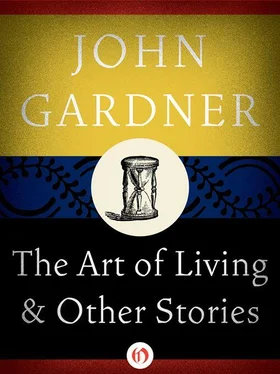John Gardner - The Art of Living - And Other Stories
Здесь есть возможность читать онлайн «John Gardner - The Art of Living - And Other Stories» весь текст электронной книги совершенно бесплатно (целиком полную версию без сокращений). В некоторых случаях можно слушать аудио, скачать через торрент в формате fb2 и присутствует краткое содержание. Год выпуска: 2010, Издательство: Open Road Media, Жанр: Современная проза, на английском языке. Описание произведения, (предисловие) а так же отзывы посетителей доступны на портале библиотеки ЛибКат.
- Название:The Art of Living: And Other Stories
- Автор:
- Издательство:Open Road Media
- Жанр:
- Год:2010
- ISBN:нет данных
- Рейтинг книги:4 / 5. Голосов: 1
-
Избранное:Добавить в избранное
- Отзывы:
-
Ваша оценка:
- 80
- 1
- 2
- 3
- 4
- 5
The Art of Living: And Other Stories: краткое содержание, описание и аннотация
Предлагаем к чтению аннотацию, описание, краткое содержание или предисловие (зависит от того, что написал сам автор книги «The Art of Living: And Other Stories»). Если вы не нашли необходимую информацию о книге — напишите в комментариях, мы постараемся отыскать её.
The Art of Living: And Other Stories — читать онлайн бесплатно полную книгу (весь текст) целиком
Ниже представлен текст книги, разбитый по страницам. Система сохранения места последней прочитанной страницы, позволяет с удобством читать онлайн бесплатно книгу «The Art of Living: And Other Stories», без необходимости каждый раз заново искать на чём Вы остановились. Поставьте закладку, и сможете в любой момент перейти на страницу, на которой закончили чтение.
Интервал:
Закладка:
Innocently, the girl asked, “Are you religious or anything?”
“Well, no—” He caught himself. “More or less,” he said.
“You’re more or less in business and you’re more or less religious,” the girl said, and smiled as if she’d caught him. “Are you a gambler, then?”
He laughed. “Is that what I look like?”
She continued to smile, but studied him, looking mainly at his black-and-gray unruly hair. “Actually, I never saw one, that I know of. Except in movies.”
Nimram mused. “I guess we’re pretty much all of us gamblers,” he said, and at once felt embarrassment at having come on like a philosopher or, worse, a poet.
“I know,” she said without distress. “Winners and losers.”
He shot her a look. If she was going to go on like this she was going to be trouble. Was she speaking so freely because they were strangers? — travellers who’d never meet again? He folded and unfolded his hands slowly, in a way that would have seemed to an observer not nervous but judicious; and, frowning more severely then he knew, his graying eyebrows low, Nimram thought about bringing out the work in his attaché case.
Before he reached his decision, their stewardess was bending down toward them, helping the girl drop her tray into position. Nimram lowered his, then took the wineglass and bottle the stewardess held out. No sooner had he set down the glass than the plane hit what might have been a slanted stone wall in the middle of the sky and veered crazily upward, then laboriously steadied.
“Oh my God, dear God, my God!” the girl whispered.
“You are religious,” Nimram said, and smiled.
She said nothing, but sat rigid, slightly cross at him, perhaps, steadying the glass on the napkin now soaked in Coke.
The pilot came on again, casual, as if amused by their predicament. “Sorry we can’t give you a smoother ride, folks, but looks like Mother Nature’s in a real tizzy tonight. We’re taking the ship up to thirty-seven thousand, see if we can’t just outfox her.”
“Is that safe?” the girl asked softly.
He nodded and shrugged. “Safe as a ride in a rockingchair,” he said.
They could feel the plane nosing up, climbing so sharply that for a moment even Nimram felt a touch of dismay. The bumping and creaking became less noticeable. Nimram took a deep breath and poured his wine.
Slowly, carefully, the girl raised the Coke to her lips and took a small sip, then set it down again. “I hope it’s not like this in Chicago,” she said.
“I’m sure it won’t be.” He toasted her with the wineglass — she seemed not to notice — then drew it to his mouth and drank.
He couldn’t tell how long he’d slept or what, if anything, he’d dreamed. The girl slept beside him, fallen toward his shoulder, the cabin around them droning quietly, as if singing to itself, below them what might have been miles of darkness, as if the planet had silently fallen out from under them, tumbling toward God knew what. Here in the dimly lit cabin, Nimram felt serene. They’d be landing at O’Hare shortly — less than two hours. Arline would be waiting in the lounge, smiling eagerly, even more pleased than usual to see him, after three long days with her parents. He’d be no less glad to see her, of course; yet just now, though he knew that that moment was rushing toward him, he felt aloof from it, suspended above time’s wild drive like the note of a single flute above a poised and silent orchestra. For all he could tell, the plane itself might have been hanging motionless, as still as the pinprick stars overhead.
The cabin had grown chilly, and, carefully, making sure he didn’t wake her, Nimram raised the girl’s blanket toward her throat. She stirred, a muscle along her jaw twitching, but continued to sleep, her breathing deep and even. Across the aisle from them, an old woman opened her eyes and stared straight ahead, listening like someone who imagines she’s heard a burglar in the kitchen, then closed them again, indifferent.
Thoughtfully, Nimram gazed at the sleeping girl. On her forehead, despite the cold, there were tiny beads of sweat. He considered brushing the hair back from her face — it looked as if it tickled — but with his hand already in the air he checked himself, then lowered the hand. She was young enough to be his daughter, he mused, pursing his lips. Thank God she wasn’t. Instantly, he hated it that he’d thought such a thing. She was some poor devil’s daughter. Then it dawned on Nimram that she was young enough, too, to be Arline’s daughter, from the time before Arline and he had met. Arline was thirty-nine, the girl sixteen. The faintest trace of a prickling came to his scalp, and he felt now a different kind of chill in the cabin, as if a cloud had passed between his soul and some invisible sun. “Don’t ask!” Arline would say when he drew her toward the subject of her life — that is, her love-life — before they knew each other. “I was wild,” she would say, laughing, “God!” and would touch his cheek with the back of her hand. The dark, infantile part of Nimram’s mind seized on that now with the same blind obstinance as it had earlier seized on the idea that the girl was Arline’s sister. Consciously, or with his brain’s left lobe, perhaps, he knew the idea was nonsense. Arline’s laugh had no abandoned child in it, only coy hints of old escapades — love-making on beaches or in the back seats of cars, drunken parties in the houses of friends when the parents were far away in Cleveland or Detroit, and then when she was older, affairs more serious and miserable. She had been married, briefly, to a man who had something to do with oil-rigs. About that he knew a fair amount, though with her Anglo-Saxon ideas of what was proper she hated to speak of it. In any case, the idea that the girl might be her daughter was groundless and absurd; if it remained, roaming in the dark of his mind, it remained against his will, like a rat in the basement, too canny to be poisoned or trapped. Even so, even after he’d rejected it utterly, he found that the groundless suspicion had subtly transmuted the way he saw the girl. He felt in his chest and at the pit of his stomach an echo of the anguish her parents must be feeling, a shadowy sorrow that, for all his notorious good fortune, made him feel helpless.
Strange images began to molest Nimram’s thoughts, memories of no real significance, yet intense, like charged images in a dream. Memories, ideas … It was hard to say what they were. It was as if he had indeed, by a careless misstep, slipped out of time, as if the past and present had collapsed into one unbroken instant, so that he was both himself and himself at sixteen, the age of the girl asleep beside him.
He was riding on a train, late at night, through Indiana, alone. The seats were once-red plush, old and stiff, discolored almost to black. There was a round black handle, like the handle on a gearshift, that one pulled to make the back recline. Toward the rear of the car an old man in black clothes was coughing horribly, hacking as if to throw up his lungs. The conductor, sitting in the car’s only light, his black cap pulled forward to the rim of his glasses, was laboriously writing something, muttering, from time to time — never looking up from his writing toward the cougher—“God damn you, die!” It was so vivid it made his scalp prickle, the musical thrumming of wheels on rails as distinct in Nimram’s mind as the drone of the airplane he sat in. The wheels and railjoints picked up the muttered words, transforming them to music, a witless, ever-lastingly repetitive jingle: God damn you, die! (click) God damn you, die! (click) …
Sometimes he’d awakened in terror, he remembered, riding on the train, convinced that the train had fallen off the tracks and was hurtling through space; but when he looked out the window at the blur of dark trees and shrubs rushing by, the ragged fields gray as bones in the moonlight, he would be reassured — the train was going lickety-split, but all was well. Though it seemed only an instant ago, if not happening right now, it also seemed ages ago: he’d lived, since then, through innumerable train rides, bus rides, plane rides — lived through two marriages and into a third, lived through God knew how many playing jobs, conducting jobs, fund-raising benefits, deaths of friends. He’d lived through warplane formations over Brooklyn; explosions in the harbor, no comment in the papers; lived through the birth and rise of Israel, had conducted the Israel Philharmonic; lived through … but that was not the point. She was sixteen, her head hanging loose, free of the pillow, like a flower on a weak, bent stem. All that time, the time he’d already consumed too fast to notice he was losing it — it might have been centuries, so it felt to him now — was time the girl would never get.
Читать дальшеИнтервал:
Закладка:
Похожие книги на «The Art of Living: And Other Stories»
Представляем Вашему вниманию похожие книги на «The Art of Living: And Other Stories» списком для выбора. Мы отобрали схожую по названию и смыслу литературу в надежде предоставить читателям больше вариантов отыскать новые, интересные, ещё непрочитанные произведения.
Обсуждение, отзывы о книге «The Art of Living: And Other Stories» и просто собственные мнения читателей. Оставьте ваши комментарии, напишите, что Вы думаете о произведении, его смысле или главных героях. Укажите что конкретно понравилось, а что нет, и почему Вы так считаете.












